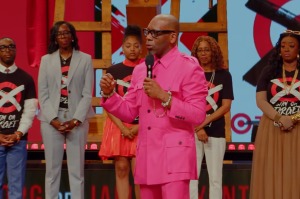Admit Your Weaknesses, Expand Your Ministry
I think there are two great confessions in the Bible. One of them is Peter's great confession in Mark 8:29: "You are the Christ." Our faith is built on that great confession. Then there's what I call Paul's great confession in Acts 14:15 at Iconium: "We too are only men, human like you." (NIV) I know a lot of pastors who are quick to agree with the first confession, but they're more cautious to proclaim Paul's confession. A lot of us are more interested in proclaiming our spirituality than admitting our humanity. We want to deny that we are mere mortals and appear super human.
But to deny your humanity is not only untruthful, it's a disservice to both yourself and those you serve. The fact is that God likes to take weaknesses and turn them into strengths.
In this context, I'm not talking about sins of character – like greed, overeating, or laziness. I mean any limitation in your life or ministry that you've inherited and can't change.
Maybe it's a circumstantial limitation or a disadvantage that you're facing in your church. It could be emotional limitations, scars we all carry from childhood. It could be personality or temperament characteristics. Or it could be physical or talent limitations that you have.
But we're all limited by something. We all carry the Gospel in jars of clay. Yet the limitations that God allows in our lives can actually be a blessing in disguise if we're honest about them. Here's how:
1. You'll have a greater dependence upon God. This is a lesson that we have to learn over and over again in ministry. At times, we forget that we find our power in our weakness. Usually we resist or resent any limitation that we have on our ministry. We usually ask God to remove them. But if God shows himself strong in these limitations, then why should he take the limitation away? The fact is sometimes God works through our human weaknesses rather than eliminating them.
Remember the story of God using Gideon to overthrow the Midianites? He chose the youngest kid in the poorest family in Israel. Then before God let Gideon go to battle against 135,000 Midianites, God whittled down the army to only 300 men, which meant the odds were now 450 to one. Why? God wanted them to trust him alone for success.
When I have a limitation in my ministry and personal life, it is an opportunity to trust God more. Andre Crouch said it like this, "If I never had a problem, I'd never know God could solve them."
2. It prevents pride. Paul was given a thorn. We don't know what that thorn was, but we know it caused him pain and limited his ministry – and we know it kept Paul humble. In 2 Corinthians 12:7-10 Paul says, "To keep me from becoming conceited because of these surpassingly great revelations, there was given me a thorn in my flesh, a messenger of Satan, to torment me."
You can understand why Paul would be a little proud. He had written more than two-thirds of the New Testament, been persecuted for his faith in Jesus, and had helped spread Christianity throughout the known world. But it was hard to be arrogant about his own accomplishments, because he knew he had great weaknesses.
I've read that Paul Y. Cho, the pastor of the world's largest church in Seoul, Korea, experienced a period of physical weakness in his ministry. It occurred in 1964 when he had several thousand members in his church. He wrote, "I began to think I was one of God's accomplished servants, and I almost entered into a complacency in my ministry. Then God allowed the perplexity of physical weakness to be my thorn ... . After God had made the needed changes as a part of my modified mentality, the perplexity of weakness was lifted. I regained strength and the power to institute the needed changes. My life, my ministry, and my church have never been the same since. All three reached heights I'd only dreamed of before."
3. It causes a greater dependence on other Christians. One of the dangers of our strengths is that it breeds an independent spirit. God allows weaknesses in each of us so that all parts of his body will recognize their need for one another. None of us can stand alone. Our humanity demands interdependence. It produces fellowship. Vance Havner says, "Snowflakes are frail, but if enough of them stick together they can stop traffic."
4. It expands our capacity to minister. If you're going to have a Christ-like ministry it means that sometimes other people are going to find healing in your wounds. I believe that our greatest messages come out of our deepest hurts. One of the most powerful testimonies I've ever heard was when a well known pastor shared from a broken heart how one of his kids had gone off the deep end and got involved in drugs and such. Through that testimony, he was able to minister to many, many families among the thousands who were listening to him.
Paul says in 2 Corinthians 1:4:"[God] comforts us in all our troubles so that we can comfort others. When others are troubled, we will be able to give them the same comfort God has given us." (NLT)
Pain sensitizes us to the hurts of others. If you've never struggled with any weaknesses, my guess is that your ministry is out of touch with those you want to minister to. Pastors who deny any struggles, and deny that they've had any pain are labeled as unreal. Our weakness and failures can be used to expand our capacity to minister to others. God helps us in trouble, then we comfort others with the same comfort we've been given.
You only get these benefits if you're willing to share your weakness. If you hold back the weaknesses, faults, and pain in your life, it's of no benefit to those you could possibly minister to.
_______________________________________________
Rick Warren is the founding pastor of Saddleback Church in Lake Forest, Calif., one of America's largest and best-known churches. In addition, Rick is author of the New York Times bestseller The Purpose-Driven Life and The Purpose-Driven Church, which was named one of the 100 Christian books that changed the 20th Century. He is also founder of Pastors.com, a global Internet community for ministers. Copyright 2005 Pastors.com, Inc. Used with permission. All rights reserved.





























